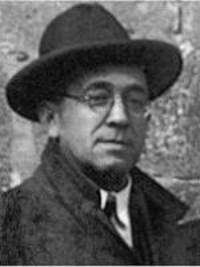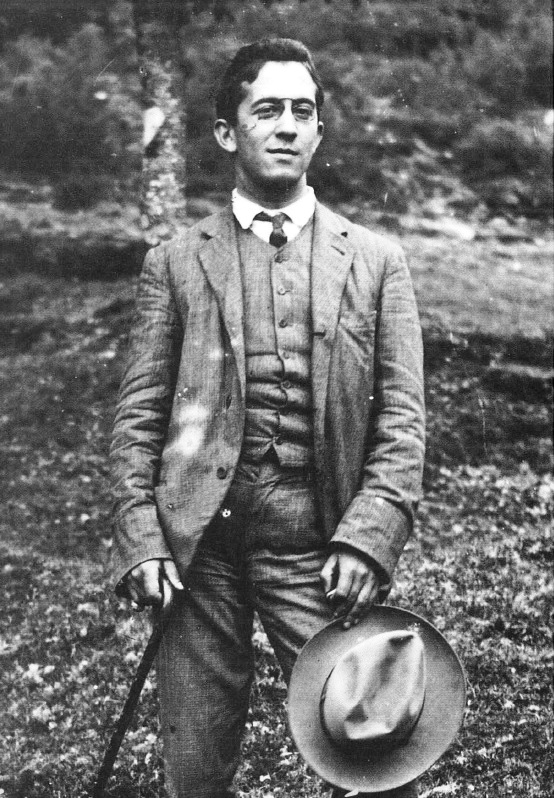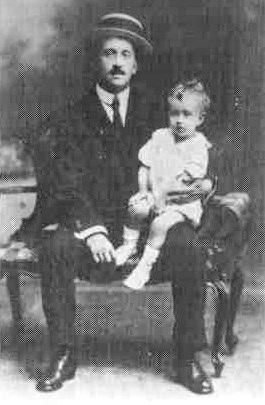<Back to Index>
- Writer Antonio Losada Diéguez, 1884
PAGE SPONSOR



Antón Losada Diéguez (b. Moldes, (Boborás), Spain, 22 December 1884 - d. Pontevedra, Spain, 15 October 1929) was a writer, Spanish politician, member of the Irmandades da Fala of Ourense, co-founder of the magazine Nós and correspondent of the Royal Galician Academy. He was author of half a dozen books of poetry, seven books, two political writings, the incomplete work A domeadora and the speech Ouservacións encol da prosa galega. He became a member in the Seminar of Galician Studies. He was honored on the Day of the Galician Letters of 1985.
Antón Losada belonged to the Hidalgo family of rural nobility of ultra - traditionalist, deeply Catholic ideology. He was the son of Miguel Losada y Losada (1860 - 1913) and Carmen Diéguez Arias y Belt (1850 - 1888), who died of tuberculosis. He spent five years as an intern at the Santiago Apostol School of the Society of Jesus in Pasaxe (province of Pontevedra). He studied literature at the University of Deusto, graduating in 1906. He took a law course at the University of Santiago de Compostela between 1902 and 1903, where he also acted as assistant professor of Armando Cotarelo Valledor. His first writings were not published. In 1904, he went to Madrid where he obtained a doctorate in philosophy and literature. During these years, he wrote four theatrical pieces in Spanish that were presented in several contests.
In 1907, he returned to Galicia to take part in the agricultural movement.
He founded the agricultural unions in A Estrada and in other areas of
Galicia. During 1910, he relocated his permanent residence in Galicia
where he got a political appointment to the jaimismo and was chosen as
secretary of the Traditionalistic Xunta of Santiago de Compostela.
In 1911, he left Galicia again for Madrid in order to prepare for the civil service examination.
In 1913, he won a place as professor of an institute in the Canary
Islands. He completed his degree in law in Santiago, where he met Lois Porteiro.
On 25 June 1915, he married Albina Espinosa Cervela, daughter of
Laurentino Espinosa Valladares, with whom he had his first son, Antón.
She died of typhus on 17 December 1916. From 1916, he supported the jaimismo movement and began to praise Catalan regionalism.
On 31 December 1920, Antón married for the second time, this time
marrying the sister of his first wife, Mercedes Espinosa Cervela, with
whom he had six more children.
1917 was to be fundamental in the political path of Losada since he became a member of the Irmandades da Fala. On 17 October, he wrote to Porteiro requesting information and, by 30 October, he had already been integrated into the Irmandade. During that year, he traveled to Barcelona with a delegation of the Irmandades to celebrate a Galician Week and got in contact with the Lliga. When Antón went back to Ourense he was responsible for receiving Francesc Cambó, and was responsible, with Rodrigo Sanz and Lois Porteiro, for organizing the Galician autonomy candidatures in the province of Ourense for the Spanish general election held in 1918, in coalition with the mauristas of José Calvo Sotelo. The electoral defeat caused demoralization in the Irmandades and Losada concentrated his efforts in consolidating the group. In order to do so, he wrote many articles in the press, especially in El Emigrado, La Región, O Tío Marcos d'a Portela, A Nosa Terra, El Estradense and Alborada wherein his writings in Galician could be found, and at the same time continuing his work as Catholic propagandist in Pontevedra acting as president of Catholic Action and of the local Circle of Catholic Workers venues. He also tried to promote some of the first shy attempts have the Galician language adopted in the liturgy. He even translated Salve Regina into that language.
In November 1918, he chaired the I Nationalist Assembly of Lugo. Along with Risco and Arturo Noguerol, in 1920, he founded the Nós
magazine. He accompanied Risco in the training of the Irmandade
Nazonalista Galician during 1922 and was his Propaganda Minister for a
year, failing in his attempts to reunify the galeguismo movement.
On May 12, 1924, Antón Losada became a member in the Seminar of Galician Studies with the speech "Ouservacións encol da prosa galega". In reliance on Calvo Sotelo's promises, Losada collaborated initially with the Primo de Rivera dictatorship, as a provincial deputy in Pontevedra. During that period, Antón took part in the failed attempts to establish a Mancomunity of Galicia, leading to his capitulation at the beginning of 1925. During the rest of the dictatorship, he participated in cultural activities such as founding the Choral Polifónica of Pontevedra, the Eiriña Football Club and his work in the Seminario de Estudos Galegos, but without forgetting the aspirations for autonomy for Galicia. He was only 45 years old when he died in Pontevedra in 1929.
Losada was a corresponding member of the Royal Galician Academy (May
22, 1928) and was honored on the Day of the Galician Letters in 1985.
From joining the Irmandades until his death, Losada is known to have written a half dozen poems, seven short stories, an unfinished fragment of a comedy, two articles about art and some other articles. In 1985, his Obra completa (Complete works) were published.